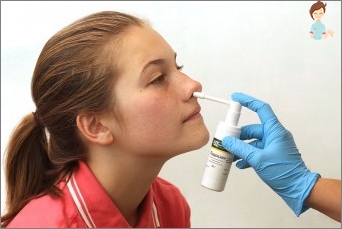Indications for the use of lidocaine during pregnancy
The composition of Lidocaine and the principle of operation. Is it possible to use lidocaine during pregnancy? Contraindications, methods of application and dosage. Side effects. special instructions
Lidocaine is a local painkillers with an antiarrhythmic effect used in almost all spheres of medicine. It is produced in different forms, convenient for one or another case: a solution for injections of different concentrations, aerosol, gel, spray, eye drops.
Action and Composition of Lidocaine
 The drug in ampoules is based on lidocaine hydrochloride and water for injection. Parenteral forms still contain sodium chloride. Solution in ampoules transparent and does not smell.
The drug in ampoules is based on lidocaine hydrochloride and water for injection. Parenteral forms still contain sodium chloride. Solution in ampoules transparent and does not smell.
The aerosol is used for topical use, contains 4.8 mg of lidocaine for one dose. As auxiliary components, includes: Mint oil, propylene glycol and ethanol. Like a solution, it is colorless, it has a bitter flavor of menthol and similar smell.
The validity of the aerosol and the solution varies from 60 minutes to one and a half hours, but with acidosis (inflammation) of the tissue, its anesthetic effect is insignificant.
Lidocaine during pregnancy is used most often in the form of a spray. It acts very quickly – for 1 minute.
The maximum effect is saved for about 6 minutes, and then gradually decreases, completely disappearing after another quarter of an hour.
Lidocaine can be used in almost all situations when local anesthesia is needed. It does not irritate the fabric, expands the vessels, is evenly distributed in the body, but can penetrate the placental barrier.
Is it possible to use lidocaine during pregnancy?
The tool is used for local anesthesia in medical manipulations causing pain, surgical interventions, painful endoscopic and instrumental studies. Very often you have to use it in dental practice.
Indication to the use of the means are the following states:
 Removal of movable and drop-down teeth;
Removal of movable and drop-down teeth;- Excision of surface abscesses;
- In the process of negotiation;
- Overlaying seams in injuries or wounds in the mouth;
- Removal of bone fragments after injury of the oral cavity;
- Fixation of the crown on the tooth;
- Installation of dentures;
- Removal of the inflamed language of the tongue;
- When preparing for an X-ray to reduce increased pharyngeal reflex;
- Removal of benign tumors on the mucous membrane;
- Opening of the cyst of the salivary glands.
Surely, many are known that in the period of toothing, problems with teeth are very often arising. That is why lidocaine is often used during pregnancy for the treatment of teeth, but only in the form of spray!
Contraindications for use
Lidocaine refers to potent drugs, like all other anesthesiological drugs, therefore there is a high probability of developing side effects.
Contraindications are the following diseases and conditions:
 Abundant bleeding;
Abundant bleeding;- Severe heart failure;
- Arterial hypotension;
- Violation of the liver function;
- Infection localizing in the estimated area of drug administration;
- Individual intolerance;
- Miasti;
- Reduced blood pressure;
- Cardiogenic shock.
Methods of application and dosage
Dose depends on the type of manipulation, anesthesia, patient state. The maximum allowable amount for an adult – 4.5 mg per kilogram of body mass. Lidocaine as spray used during pregnancy for spraying on mucous membranes.
 As a rule, most used in dentistry. To perform certain manipulations, it may be necessary from 1 to 3 spraying. Dose, as a rule, depends on the fabric area that need to anesthetically.
As a rule, most used in dentistry. To perform certain manipulations, it may be necessary from 1 to 3 spraying. Dose, as a rule, depends on the fabric area that need to anesthetically.
When intravenous administration, the drug is able to penetrate through the placental barrier, so its use during this period is undesirable. However, this does not mean that it does not apply. Lidocaine can be used in strict indications, for example, in the threat of the life of the future mother, as well as after an assessment by a specialist possible risks for the fetus.
It is recommended to use it in the form of spray. If you keep dosage, it does not represent dangers. Otherwise, when penetrating the placenta, the pathology of the child’s development is possible.
Side effects
 Nervous system – headache, drowsiness, euphoria, anxiety, ears, incoherent speech, tremor, convulsions, violation, feeling of numbness of language, dizziness;
Nervous system – headache, drowsiness, euphoria, anxiety, ears, incoherent speech, tremor, convulsions, violation, feeling of numbness of language, dizziness;- Gastrointestinal tract – nausea, vomiting, violation of the process of digestion;
- Heart and vessels – a sharp drop or an increase in blood pressure, tachycardia, pain in the chest, collapse, bradycardia;
- Allergic reactions: hyperthermia, dermatitis, rash and sebum itching;
- Local reactions – burning in place of use.
Special instructions for use
In some cases, it is possible to reduce the standard dose of the drug, for example, during pregnancy. Also, the need for its decrease occurs with renal and liver failure, epilepsy, diseases of the blood formation system.
With extreme caution, the means is used in injuries and damage to mucous, weakened patients. Using spray, you need to avoid its eyes, respiratory tract.
It is impossible to use lidocaine with digitoxine, beta-adrenoblockers, stripping drugs, aymalin, verapamil, amiodaron, novocainamide, hexenal, Mao, Polymixin-B inhibitors, Cimetidine, Phenytio, ethanol, conpaphenon, sleeping bags and sedatives (sedative) drugs.


